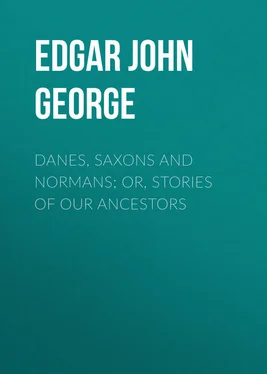John Edgar - Danes, Saxons and Normans; or, Stories of our ancestors
Здесь есть возможность читать онлайн «John Edgar - Danes, Saxons and Normans; or, Stories of our ancestors» — ознакомительный отрывок электронной книги совершенно бесплатно, а после прочтения отрывка купить полную версию. В некоторых случаях можно слушать аудио, скачать через торрент в формате fb2 и присутствует краткое содержание. Жанр: foreign_antique, foreign_prose, Историческая проза, на английском языке. Описание произведения, (предисловие) а так же отзывы посетителей доступны на портале библиотеки ЛибКат.
- Название:Danes, Saxons and Normans; or, Stories of our ancestors
- Автор:
- Жанр:
- Год:неизвестен
- ISBN:нет данных
- Рейтинг книги:5 / 5. Голосов: 1
-
Избранное:Добавить в избранное
- Отзывы:
-
Ваша оценка:
- 100
- 1
- 2
- 3
- 4
- 5
Danes, Saxons and Normans; or, Stories of our ancestors: краткое содержание, описание и аннотация
Предлагаем к чтению аннотацию, описание, краткое содержание или предисловие (зависит от того, что написал сам автор книги «Danes, Saxons and Normans; or, Stories of our ancestors»). Если вы не нашли необходимую информацию о книге — напишите в комментариях, мы постараемся отыскать её.
Danes, Saxons and Normans; or, Stories of our ancestors — читать онлайн ознакомительный отрывок
Ниже представлен текст книги, разбитый по страницам. Система сохранения места последней прочитанной страницы, позволяет с удобством читать онлайн бесплатно книгу «Danes, Saxons and Normans; or, Stories of our ancestors», без необходимости каждый раз заново искать на чём Вы остановились. Поставьте закладку, и сможете в любой момент перейти на страницу, на которой закончили чтение.
Интервал:
Закладка:
It was under such romantic circumstances, if we may credit ancient chroniclers and modern historians, that Godwin entered on that marvellous career which was destined to conduct him to more than regal power in England. Presented by Ulf to Canute, the son of Wolwoth soon won the favour of the Danish king; nor was he of a family whose members ever allowed any scrupulous adherence to honour to stand in the way of ambitious aspirations. Indeed, he was nephew of that Edric Streone who had betrayed Ethelred the Unready, and whom Canute had found it necessary to sacrifice to the national indignation; and it has been observed that, "even as kinsman to Edric, who, whatever his crimes, must have retained a party it was wise to conciliate, Godwin's favour with Canute, whose policy would lead him to show marked distinction to any able Saxon follower, ceases to be surprising."
But, however that may have been, Godwin, protected by the king and inspired by ambition, rose rapidly to fame and fortune. Having accompanied Canute to Denmark, and afterwards signalized his military skill by a great victory over the Norwegians, he returned to England with the reputation of being, of all others, the man whom the Danish King delighted to honour. No distinction now appeared too high to be conferred on the son of Wolwoth. Ere long he began to figure as Earl of Wessex, and husband of Thyra, one of Canute's daughters.
Godwin's marriage with the daughter of Canute did not increase the Saxon Earl's popularity. Indeed, Thyra was accused of sending young Saxons as slaves to Denmark, and regarded with much antipathy. One day, however, Thyra was killed by lightning; soon after, her only son was drowned in the Thames; and Godwin lost no time in supplying the places of his lady and his heir.
Again at liberty to gratify his ambition by a royal alliance, he wedded Githa, daughter of Sweyne, Canute's successor on the throne of Denmark; and the Danish princess, as time passed on, made her husband father of six sons – Sweyne, Harold, Tostig, Gurth, Leofwine, and Wolwoth – besides two daughters – Edith and Thyra – all destined to have their names associated in history with that memorable event known as the Norman Conquest.
Meanwhile, Godwin was taking that part in national events which he hoped would raise him to still higher power among his countrymen, when Canute the Great breathed his last, and was laid at rest in the cathedral at Winchester. Then there arose a dispute about the sovereignty of England between Hardicanute and Harold Harefoot. The South declared for Hardicanute, the North for Harefoot. Both had their chances; but Harold Harefoot being in England at the time, as we have seen, while Hardicanute was in Denmark, had decidedly the advantage over his rival.
Godwin, however, favouring Hardicanute, invited Queen Emma to England. He assumed the office of Protector, and received the oaths of the men of the South. But for once the son of Wolwoth found fortune adverse to his policy; and, having waited till Emma made peace with Harold Harefoot, the potent Earl also swore obedience, and allowed the claims of Hardicanute to rest.
But when time passed over, and affairs took a turn, when Harold Harefoot died, and Hardicanute, having come to England, ascended the throne, excited the national discontent by imposing excessive taxes, and was perpetually alarmed, in the midst of his debaucheries, with intelligence of tax-gatherers murdered and cities in insurrection, it became pretty clear that the Danish domination must, ere long, come to an end. Then Godwin, who had ever a keen eye to his interest, doubtless watched the signs of the times with all the vigilance demanded by the occasion, and marked well the course of events which were occurring to place the game in his hands. Accordingly, when, in the summer of 1041, Hardicanute expired so suddenly at Lambeth, while taking part in the wedding festivities of one of his Danish chiefs, Godwin perceived that the time had arrived for the restoration of Saxon royalty. With his characteristic energy, he raised his standard, and applied himself to the business. His success was even more signal than he anticipated. Indeed, if he had chosen, he might have ascended the throne of Alfred and of Canute. But his policy was to increase his own power without exciting the envy of others. With this view he assembled a great council at Gillingham. Acting by his advice, the assembled chiefs resolved on calling to the throne, not the true heir of England – the son of Edmund Ironsides, who resided in Hungary, and probably had a will of his own – but an Anglo-Saxon prince who had been long absent from England – an exile known to be inoffensive in character as well as interesting from misfortune, and with whom Godwin doubtless believed he could do whatever he pleased. At all events, it was as King-maker, and not as King, that the ennobled son of Wolwoth aspired, at this crisis, to influence the destinies of England.
V.
EDWARD THE CONFESSOR
While Duke William was overcoming his enemies in Normandy, and Earl Godwin was putting an end to the domination of the Danes in England, there might have been observed about the Court of Rouen a man of mild aspect and saintly habits, who had reached the age of forty. He was an exile, a Saxon prince, and one of the heirs of Alfred.
It was about the opening of the eleventh century that King Ethelred, then a widower, and father of Edmund Ironsides, espoused Emma, sister of Richard, Duke of Normandy. From this marriage sprung two sons and a daughter. The sons were named Edward and Alfred; the name of the daughter was Goda.
Edward was a native of England, and drew his first breath, in the year 1002, at Islip, near Oxford. At an early age, however, when the massacre of the Danes on the day of St. Brice resulted in the exile of Ethelred, Edward, with the other children of Ethelred and Emma, found refuge at the Court of Normandy. It was there that the youth of Edward was passed; it was there that his tastes were formed; and it was there that, brooding over the misfortunes of his country and his race, he sought consolation in those saintly theories and romantic practices which distinguished him so widely from the princes of that fierce and adventurous period which preceded the first Crusade.
When Ethelred the Unready breathed his last, in 1016, and Canute the Great demanded the widowed queen in marriage, and Emma, delighted at the prospect of still sharing the throne of England, threw herself into the arms of the royal Dane, her two sons, Edward and Alfred, remained for a time securely in Normandy. Indeed, they do not appear to have been by any means pleased at the idea of their mother uniting her fate with a man whom they had regarded as their father's mortal foe. However, as years passed over, the sons of Ethelred received an invitation from Harold Harefoot to visit their native country, and they did not think fit to decline. At all events, it appears that Alfred proceeded to England, and that he went attended by a train of six hundred Normans.
On arriving in England, Alfred was immediately invited by Harold Harefoot to come to London, and, not suspecting any snare, he hastened to present himself at court. No sooner, however, had the Saxon prince reached Guildford than he was met by Earl Godwin, conducted under some pretence into the Castle, separated from his attendants – who were massacred by hundreds – and then put in chains, to be conveyed to the Isle of Ely, where he was deprived of his sight, and so severely treated that he died of misery and pain.
Edward, who had remained in Normandy, soon learned with horror that his brother had been murdered; and when Hardicanute succeeded Harold Harefoot, he hastened to England to demand justice on Godwin. Hardicanute received his half-brother with kindness, promised that he should have satisfaction, and summoned the Earl of Wessex to answer for the murder of Prince Alfred. But Godwin's experience was great, and his craft was equal to his experience. Without scruple, he offered to swear that he was entirely guiltless of young Alfred's death, and at the same time presented Hardicanute with a magnificent galley, ornamented with gilded metal, and manned by eighty warriors, every one of whom had a gilded axe on his left shoulder, a javelin in his right hand, and bracelets on each arm. The young Danish king looked upon this gift as a most conclusive argument in favour of Godwin's innocence – and the son of Wolwoth was saved.
Читать дальшеИнтервал:
Закладка:
Похожие книги на «Danes, Saxons and Normans; or, Stories of our ancestors»
Представляем Вашему вниманию похожие книги на «Danes, Saxons and Normans; or, Stories of our ancestors» списком для выбора. Мы отобрали схожую по названию и смыслу литературу в надежде предоставить читателям больше вариантов отыскать новые, интересные, ещё непрочитанные произведения.
Обсуждение, отзывы о книге «Danes, Saxons and Normans; or, Stories of our ancestors» и просто собственные мнения читателей. Оставьте ваши комментарии, напишите, что Вы думаете о произведении, его смысле или главных героях. Укажите что конкретно понравилось, а что нет, и почему Вы так считаете.












